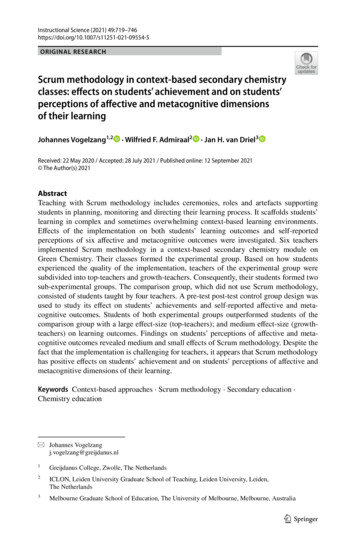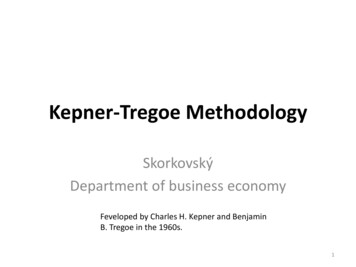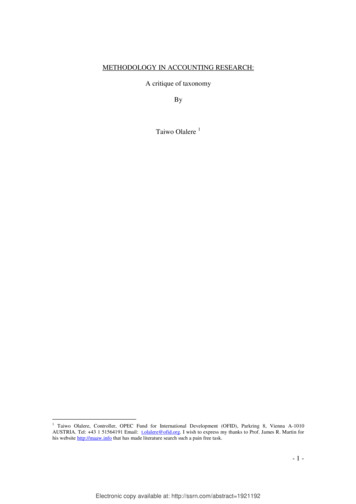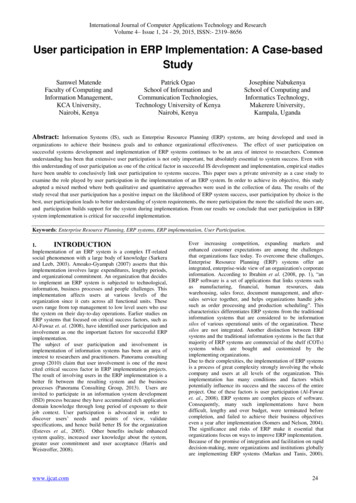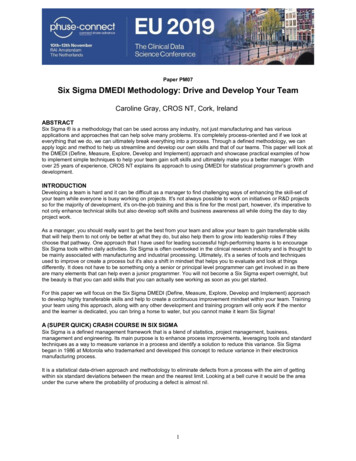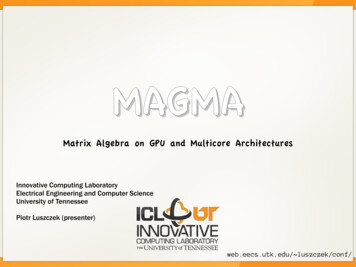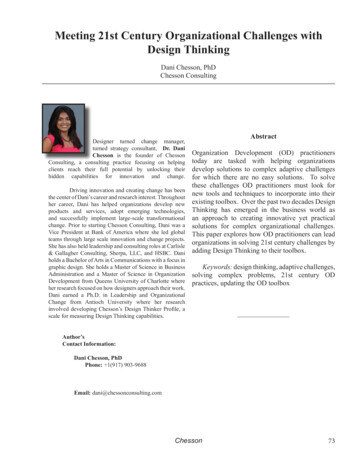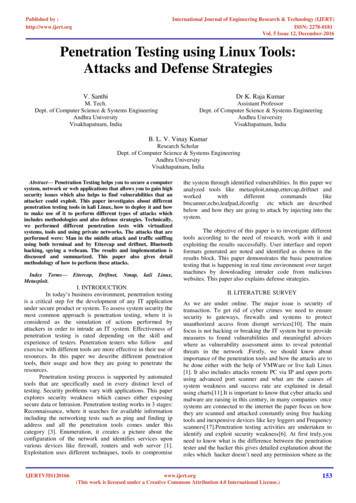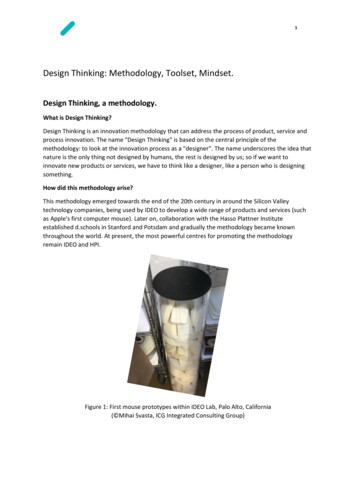
Transcription
This pageintentionally leftblank
NEW AGE INTERNATIONAL (P) LIMITED, PUBLISHERSPUBLISHING FOR ONE WORLDNew Delhi · Bangalore · Chennai · Cochin · Guwahati · HyderabadJalandhar · Kolkata · Lucknow · Mumbai · RanchiVisit us at www.newagepublishers.com
Copyright 2006 New Age International (P) Ltd., PublishersPublished by New Age International (P) Ltd., PublishersAll rights reserved.No part of this ebook may be reproduced in any form, by photostat, microfilm,xerography, or any other means, or incorporated into any information retrievalsystem, electronic or mechanical, without the written permission of the publisher.All inquiries should be emailed to rights@newagepublishers.comISBN : 978-81-224-2418-8PUBLISHING FOR ONE WORLDNEW AGE INTERNATIONAL (P) LIMITED, PUBLISHERS4835/24, Ansari Road, Daryaganj, New Delhi - 110002Visit us at www.newagepublishers.com
PrefaceThe education system of India has covered a long distance from gurukul system to British Empire.During this period it has faced so many social problems and it has tried to save their own traditions andsocial system for the new generation as we are feeling now and observing their qualities to develop ourcountry, as we want. But we should not forget that present tradition system of education has their ownqualities due to these qualities and principles it has covered a long distance of his development, now itis a part of the history. Here is a question that if we have our own history of education and researchthan why we are carrying the British education system and research since independence? It is a verymere question and we have to facing a lot of problems almost in every walk of life to find its answer.An Indian citizen can simply answer that the field of education and research has also been pol1utedwith those significant problems, which are carrying by the Indian Education System and researchsince 1947.India has got the British system of Education having its own structure and functions in heritageand a concerted effort has been made since, then to utilize that heritage in order to achieve comparableresults by democratic means; though we pledged in 1950 on the 26th day of January. We, the people ofIndia having solemnly resolved to constitute into a sovereign democratic republic and to secure to allcitizens; justice-social, economic and political liberty of thoughts, of status and opportunity and topromote among them all, fraternity assuring dignity of the individual and the unity of Nation; in ourconstituent assembly do hereby adopt, exact and give to ourselves this constitution.Could we fulfill this pledge to this date? The answer is very big no. Neither we could maintain ourdemocratic ideals nor could we achieve justice, fraternity and liberty. Even we failed to unite ournation–mentally, and physically, both. After analyzing the various factors we come to the conclusionthat it is all due to our faulty system of education and their wrong objectives directed by the our oldeducationist. To help our county and society and also to achieve the desired goal of life, we shouldunderstand and to create awareness about the research of our social system.The goal of life is to get good and effective research based education for which we have needgood and effective education system. The present volume is a humble effort to present the researchproblems of social sciences through their past history, as author has perceived.
(vi)Almost every social research aspect of social sciences and their problems are covered in thisbook. The problems can be solved only if there are a large number of idealistic education and researchworkers devoted to the cause. The author will be highly thankful if you will send your valuable suggestionto up-grade the chapters of this book.Y.K. Singh
er–20:Chapter–21:Preface . (v)Perception of Research . 1Assortment of a Problem . 20Appraise of Related Literature . 35Foundation of Hypothesis . 54Research Planning and Sampling . 77Survey Method . 99Historical Method . 112Philosophical Method . 122Experimental Method . 134Case Study Method . 147Genetic Method . 161Design of Experiments . 170Tools of Research . 191Collection of Data . 212Analysis of Data. 222Research Report . 243Action Research. 261Organisation of Statistical Data . 271Measures of Central Tendency . 286Measures of Variability . 296Correlation . 304Bibliography . 311
This pageintentionally leftblank
Chapter 1Perception of ResearchResearch has moved during this century from the periphery to the centre of our social and economiclife. What is the nature of this force? Why it is getting momentum? Most of us recognize that theprogress which has been made in our society has been largely the result of research, we do not have anexact definition of the term. Most of us have a vague idea of what is involved but our concept ofresearch generally is too much oriented toward experimentation as conducted in the social sciences.MEANING OF RESEARCHResearch simply seeks the answer of certain questions which have not been answered so far and theanswers depend upon human efforts. It may be illustrated by taking an example of the moon. Someyears ago man did not know what exactly the moon is? Was this problem which had no solution? Mancould only make some assumptions about it but the man now this time by his efforts, he went to themoon brought the soil of the moon and studied it. The man is now able to give concrete answer of theproblem what is the moon? But the question arises, “Is the answer of the question in examination alsoresearch”? The answer is ‘no’, because the answers of these questions are available. They are availablein text-books, class-notes etc. Research answers only those questions of which the answers are notavailable in literature i.e., in human knowledge. Thus, we can say research seeks the answer only ofthose questions of which the answers can be given on the basis of available facilities.Actually research is simply the process of arriving as dependable solution to a problem throughthe planned and systematic collection, analysis and interpretation of data. Research is the most importantprocess for advancing knowledge for promoting progress and to enable man to relate more effectivelyto his environment to accomplish his purpose and to resolve his conflicts. Although it is not the onlyway, it is one of the more effective ways of solving scientific problems.From the beginning of time man has noted certain irregularities among the phenomena and eventsof his experiences and has attempted to devise laws and principles which express these regularities.These laws and principles are of course not without expectation, any law is valid only under theconditions under which it was derived. Even though objects tend to fall, they have been known to risewhen other forces are active, but this does not deny the general principle of gravity. Research isdevoted to find the conditions under which a certain phenomenon occurs and the conditions underwhich it does not occur in what might appear to be similar circumstances.Our culture puts such a premium on science that the terms science and scientific are frequentlymisused. Research is also frequently in contexts where little research in the true sense of the world isactually done. A person no longer looks up a word in dictionary or a historical fact in the encyclopaediahe researches it. Many agencies claiming to do research are engaged in nothing more than fact-findings.
2Fundamental of Research MethodologyTERM RESEARCHThe term ‘Research’ consists of two words:Research Re Search‘Re’ means again and again and ‘Search’ means to find out something, the following is theprocess:O bservesC ollection of dataPhenom enaPersonAgain and againC onclusionsAnalysis of dataTherefore, research means to observe the phenomena again and again from different dimensions.For example there are many theories of learning due to the observation from different dimensions.The research is a process of which a person observes the phenomena again and again andcollects the data and on the basis of data he draws some conclusions.Research is oriented towards the discovery of relationship that exists among phenomena of theworld in which we live. The fundamental assumption is that invariant relationship exists betweencertain antecedents and certain consequents so that under a specific set of conditions a certain consequentscan be expected to follow the introduction of a given antecedent.DEFINITIONS OF RESEARCHAccording to Rusk“Research is a point of view, an attitude of inquiry or a frame of mind. It asks questions which havehitherto not been asked, and it seeks to answer them by following a fairly definite procedure. It is nota mere theorising, but rather an attempt to elicit facts and to face them once they have been assembled.Research is likewise not an attempt to bolster up pre-conceived opinions, and it implies a readiness toaccept the conclusions to which an inquiry leads, no matter how unwelcome they may prove. Whensuccessful, research adds to the scientific knowledge of the subject.According to George J. MoulyHe defines research as, “The systematic and scholarly application of the scientific method interpretedin its broader sense, to the solution of social studiesal problems; conversely, any systematic studydesigned to promote the development of social studies as a science can be considered research.”According to Francis G. Cornell“To be sure the best research is that which is reliable verifiable and exhaustive, so that it providesinformation in which we have confidence. The main point here is that research is, literally speaking, akind of human behaviour, an activity in which people engage. By this definition all intelligent humanbehaviour involves some research.”“In social studies, teachers, administrators, or others engage in ‘Research’ when they systematicallyand purposefully assemble information about schools, school children, the social matrix in which aschool or school system is determined, the characteristic of the learner or the interaction between theschool and pupil.”
Perception of Research3According to Clifford Woody of the University of MichiganHe writes that in an article in the Journal of Social Studies Research (1927), research is a carefullyinquiry or examination in seeking facts or principles; a diligent investigation to ascertain something,according to Webster’s New International Dictionary. This definition makes clear the fact that researchis not merely a search for truth, but a prolonged, intensive, purposeful search. In the last analysis,research constitutes a method for the discovery of truth which is really a method of critical thinking. Itcomprises defining and redefining problems; formulating hypotheses or suggested solutions; collecting,organising and evaluating data; making deductions and reaching conclusions; and at last, carefullytesting the conclusions to determine whether they fit the formulating hypotheses.According to C.C. CrawfordHe writes that “Research is simply a systematic and refined technique of thinking, employing specialisedtools, instruments, and procedures in order to obtain a more adequate solution of a problem than wouldbe possible under ordinary means. It starts with a problem, collects data or facts, analysis thesecritically and reaches decisions based on the actual evidence. It evolves original work instead of mereexercise of personal. It evolves from a genuine desire to know rather than a desire to prove something.It is quantitative, seeking to know not only what but how much, and measurement is therefore, acentral feature of it.”John W. Best thinks, “Research is considered to be the more formal, systematic, intensive processof carrying on the scientific methods of analysis. It involves a more systematic structure of investigation,usually resulting in some sort of formal record of procedures and a report of results or conclusions.”“Research is but diligent search which enjoys the high flavour or primitive hunting.”– James Harvey Robinson“Research is the manipulation of things concepts or symbols for the purpose of generalizing toextend, correct or verify knowledge, whether that knowledge aids in the practice of an art.”– Encyclopaedia of Social Science“Research is a systematized effort to gain new knowledge.”– V. Redman and A.V.H. MoryAccording to C. Francies Rummel“Research is an endeavour to discover, develop and verify knowledge. It is an intellectual process thathas developed over hundreds of years, ever changing in purpose and form and always searching fortruth.”P.M. Cook has given a very comprehensive and functional definition of the term research“Research is an honest exhaustive, intelligent searching for facts and their meanings or implicationswith reference to a given problem. The product or findings of a given piece of research should be anauthentic, verifiable and contribution to knowledge in the field studied.”He has emphasised the following characteristics of research in his definition:1. It is an honest and exhaustive process.2. The facts are studied with understanding.3. The facts are discovered in the light of problem. Research is problem-centred.4. The findings are valid and verifiable.5. Research work should contribute new knowledge in that field.
4Fundamental of Research MethodologyAccording to W.S. MonroeMonroe, University of Illinois states, “Research may be defined as a method of studying problemswhose solutions are to be derived partly or wholly from facts. The facts dealt with in research may bestatements of opinion, historical facts, those contained in records and reports, the results of tests,answers to questionnaires, experimental data of any sort, and so forth. The final purpose of research isto ascertain principles and develop procedures for use in the field of social studies; therefore, it shouldconclude by formulating principles or procedures. The mere collection and tabulation of facts is notresearch, though it may be preliminary to it on eve a part thereof.”According to R.M. HutchinsR.M. Hutchins, Chancellor of the University of Chicago, in “The Higher Learning in America” says,“Research in the sense of the development, elaboration, and refinement of principles, together with thecollection and use of empirical materials to aid in these processes, is one of the highest activities of auniversity and one in which all its professors should be engaged.”J.H. McGrath and D.E. Watson have defined the term ‘Research’ more comprehensively.“Research is a process which has utility to the extent that class of inquiry employed as theresearch activity vehicle is capable of adding knowledge, of stimulating progress and helping societyand man relate more efficiently and effectively to the problems that society and man perpetuate andcreate.”GENERAL CHARACTERISTICS OF RESEARCHThe following characteristics may be gathered from the definitions of ‘Research’1. It gathers new knowledge or data from primary or first-hand sources.2. It places emphasis upon the discovery of general principles.3. It is an exact systematic and accurate investigation.4. It uses certain valid data gathering devices.5. It is logical and objective.6. The researcher resists the temptation to seek only the data that support his hypotheses.7. The researcher eliminates personal feelings and preferences.8. It endeavours to organise data in quantitative terms.9. Research is patient and unhurried activity.10. The researcher is willing to follow his procedures to the conclusions that may be unpopularand bring social disapproval.11. Research is carefully recorded and reported.12. Conclusions and generalisations are arrived at carefully and cautiously.THE FUNCTIONS OF RESEARCHThe following are the main functions of researchThe main function of research is to improve research procedures through the refinement andextension of knowledge.
Perception of Research5The refinement of existing knowledge or the acquisition of new knowledge is essentially anintermediate step toward the improvement of the social studiesal process.The social studiesal improvement is associated with various aspects of Social Studies:(a) The function of research is to aid to making a decision concerning the refinement or extensionof knowledge in this particular area.(b) The function of research is to improve the students learning and classroom problem withwhich teacher is encountering with problems. The more effective techniques for teachingcan be developed.(c) Another function of research is to aid social studiesal administrators to improve the SocialStudiesal systems.The Researches should contribute to the theory and practice of study studies simultaneously. Itshould have the image of a helpful mechanism which can be used by researcher/researchsholar in oneway or the other, for the improvement of the process.SPECIFIC CHARACTERISTICS OF RESEARCHThe following are the main characteristics of research:1. A sound philosophy of social studies as the basis of researchRobert R. Rusk observes. “In the application of scientific procedure to social studies a sound philosophyas well as a sound commonsense must be invoked to save the scientific procedure from itself.”2. Research is based on insight and imaginationThe same writer feels, “Social studies by its reliance on research must never fail to realize that inaddition to its practical practitioner and skilled investigators, it stands in need of men and women ofimaginative insight, who look beyond, he present and behold the vision splendid. If the vision shouldfade into the light of common day, not only will the people perish, but research itself will become asterile futility.”3. Research requires an inter-disciplinary approachResearch is not the mere description of elementary and isolated facts of nature. It must be related to thestudy of complex relationships of various facts. It requires an inter- disciplinary approach.4. Research usually employs deductive reasoning processEric Hylla writes in the ‘Nature and Functions of Research’, the science of mind commonly usesmethods of description, explanation, interpretation, sympathetic or intuitive understanding methodswhich are mainly speculative and deductive in character and which rarely furnish results that can besubjected to measurement or mathematical procedures.5. Research should come out of a desire to do things betterStephen M. Corey writes. “Better social studiesal means better development or formulation ofinstructional aims, better motivation of pupils, better teaching methods, better evaluation and bettersupervision and administration, these are ‘activities’ or ‘operations’.
6Fundamental of Research Methodology6. Research is not as exact as research in physical scienceNo two human beings have ever been found to be alike. No scientific investigations of human behavioureven those of socalled “identical twins” have resulted in the findings of individuals completely similar instructure or behaviour. “In the whole world there are probably no two things exactly alike similarly notwo human beings are alike, they differ physically in size, weight, height, colour of eyes and hairtexture of skin and in a thousand other details as well as in thousands of details of mental, social andspiritual life,” writes H.C. McKown. This fact stands in the way of making research as an exactscience.7. Research is not the field of the specialist onlyW.C. Redford writes, “In sum, I believe the teachers in every country have the opportunity and thecapacity to undertake some research. Such research, carried out in the day-to-day work of the school,should be concerned directly with the problems of that school. It can properly concern itself with suchmatters as child development, class organisation, teacher-pupil relationships, interaction with thecommunity, curriculum matters, teaching techniques and many others.”Similarly, V.V. Kamat, in an article entitled “Can a teacher do research?” published in ‘Teaching’making these remarks: “Any teacher with commonsense, intelligence and insight can undertake researchin a problem. In the beginning such workers may require some guidance and training but this can bemade easily available to them at the hands of experts.”8. Research generally requires inexpensive materialIn many social studies research studies we simply need subjects, i.e., children, their social studiesaltools of daily use, paper and pencil and a few tests.9. Research is based on the subjectivity and intangibility of social phenomenaLundberg has pointed out that the physical phenomena may be known directly through sense, whereassocial phenomena are known only symbolically through words representing such phenomena as tradition,custom, attitude, values and the whole realm of so called subjective worlds.10. Research is perhaps incapable of being dealt through empirical methodAccording to Lundberg “Exact science tends to become increasingly quantitative in its units, measures,and terminology while most of the matter of social science is quantitative and does not admit ofquantitative statement. We can talk of urbanisation, cultural assimilation etc. but we can’t measurequantitatively. We may talk of growing indiscipline, but unless we can measure it, unless we canascertain the degree of indiscipline, we cannot find a perfect cure.”According to Mitchell, “Even in the work of the most statistically minded, qualitative analysiswill have a place. Always our measurements, the pre-conceptions shape our ends, our first glimpses ofnew problems, our widest generalisations will remain qualitative in form.”11. Research is based on inter dependence of causes and effectIn case of a social phenomena the cause and the effect are inter dependent and one stimulates the other.It becomes, therefore, very difficult to find as to what is the cause and what is the fore effect. MacIverrightly points out, “Social science has hitherto suffered greatly from the attempt to make it conform to
Perception of Research7method derived from the order and more abstract sciences. It has led us to look for impossible resultsand to be disappointed at not getting them. We enquire, for example, after the manner of physicalsciences which of the two related social phenomena is cause and which the effect. It usually turns outin the social sphere, that both are cause and both are effect.12. Research cannot be a mechanical processSymonds concludes that research is, . “not something that can be ground out as by a machine.Research can never be made a mechanical process. There is no problem worthy of study that does notinclude unknown elements and does not require a fresh approach and attack. Too much of the researchdone by students in recent years has smaked of the mechanical or merely following the methods andprocedures of some predecessors without clear insight, into the problem itself or the methods to beused in attacking it. Much of the research in social studies that is being published fails to receiverecognition because it lacks that spark of originality that must accompany an attack on a new problem.Research methods and techniques can be taught, but after they are mastered there is still the problemof attacking a new problem and genuine contribution to social studies cannot be made without thewillingness to pioneer into new fields or to work out new procedures. Genuine research must be anexploration. Any student who wishes to undertake research in social studies must be willing to takeventure into the unknown and only by doing so he will bring back the fruit of genuine discovery.”The criticism of research, Hugh B. Wood states: “Every year about a thousand young menand women go off justly neglected corners of knowledge and assemble tiny scraps of more or lessuseless information into a little pile of dust, which, adopted with comparative tables, correlative graphs,and other forms of academic is served up as a thesis. The reward is the little of Doctor of Philosophy,which enables its recipient to ascend the social studies as ladder and in time teach other young men andwomen to scrap together their own heaps of dust or doctoral dissertations.”OBJECTIVES OF RESEARCHThe research has the following three objectives:1. Theoretical objective2. Factual objective and3. Application objective.1. Theoretical ObjectiveThose researches whose objectives are theoretical formulate the new theories, principles or laws. Suchtype of research is explanatory because it explains the relationships of certain variables. These researchescontribute some basic knowledge to the human knowledge. The researches in different disciplines i.e.,Physics, Chemistry, Mathematics etc. have the theoretical objective.2. Factual ObjectiveThose researches whose objective is factual find out new facts. This objective is by nature descriptive.These researches describe facts or events which happened previously. Such type of research is done inhistory.
8Fundamental of Research Methodology3. Application ObjectiveThe research having application objective does not contribute a new knowledge in the fund of humanknowledge but suggests new applications. By application we mean improvement and modification inpractice. For example if anyone gives a new application of electricity then such type of research hasapplication objective.CLASSIFICATION OF RESEARCHIn actual practice, research is conducted at different levels and for different immediate purposes. Thelevel at which a person operates in the field depends on the objectives he intends to accomplish.Generally research has two levels:1. Basic level and2. Applied level.1. Basic LevelTrevers has defined basic level as basic research. It is designed to add an organized body of scientificknowledge and does not necessarily produce results of immediate practical value.2. Applied LevelApplied research is undertaken to solve an immediate practical problem and the goal of adding toscientific knowledge is secondary.A common mistake is to assume that levels differ according to complexity and that basic researchtends to be complex and applied research. Some applied research is quite complex and some basicresearch is rather simple.KINDS OF RESEARCHThere are various bases to classify the research.A. On the Basis of Objectives of ResearchOn the basis of objectives of research they are of two types:1. Fundamental research and2. Action research.B. On the Basis of Approach of ResearchOn the basis of approach of Research they are of two types:1. Longitudinal research: Historical research, case study, genetic comes under longitudinalapproach of research.2. Cross sectional research: Experimental research, survey are the examples of cross sectionalresearch.C. On the Basis of Precision in Research FindingsOn the basis of precision (accuracy) the researches are:1. Experimental research and
Perception of Research92. Non-experimental research.Experimental research is precise while non-experimental is not.D. On the Basis of Nature of FindingsOn the basis of findings Researches are of two types:1. Explanatory research: Such researches explain more concerned theories. laws andprinciples.2. Descriptive research: These are more concerned with facts.E. According to National Science FoundationThese National Science Foundation formulated a three-fold classification of research.1. Basic research: Those researches which embrace origin or unique investigation for theadvancement of knowledge.2. Applied research: Which may be characterized as the utilization in practice.3. Development research: It is the use of scientific knowledge for the production of usefulmaterials, devices, systems, methods for processes excluding design and productionengineering.F. Another Classification1. Adhoc research: Adhoc research is the class of inquiry used for a purpose alone andspecia
The research is a process of which a person observes the phenomena again and again and collects the data and on the basis of data he draws some conclusions. Research is oriented towards the discovery of relationship that exists among phenomena of the world in which we live. The fundamental
